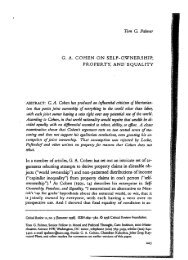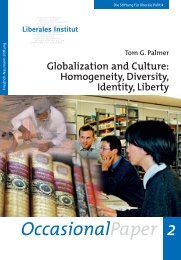Are Patents and Copyrights Morally Justified? - Tom G. Palmer
Are Patents and Copyrights Morally Justified? - Tom G. Palmer
Are Patents and Copyrights Morally Justified? - Tom G. Palmer
Create successful ePaper yourself
Turn your PDF publications into a flip-book with our unique Google optimized e-Paper software.
840 HaruardJournal ofLaw & Public Policy [Vol. iS<br />
That the publisher does not conduct his business in his own<br />
name, but in that ofanother, is confirmed by certain obligations<br />
which are universally acknowledged. Were the author<br />
to die after he had confided his [manuscript] to the publisher<br />
for printing <strong>and</strong> the publisher had agreed to the conditions,<br />
still the publisher is not free. In default of heirs, the public<br />
has a right to compel him to publish it, or to give over the<br />
[manuscript] to another who may offer himself as publisher.<br />
For it had been a business which the author, through him,<br />
wished to carry on with the public, <strong>and</strong> for which he offered<br />
himself as agent. [H]e [the publisher] possesses the [manuscript]<br />
only on condition that he shall use it with the public<br />
in the interest of theauthor. If the publisher should mutilate<br />
or falsify the work after the death of the author, or if he<br />
should fail in producing a number ofcopies equal to the dem<strong>and</strong>,<br />
then the public would have the right to require him to<br />
enlarge the edition <strong>and</strong> to exact greater accuracy, <strong>and</strong>, if he<br />
refused to meet these dem<strong>and</strong>s, to go elsewhere to get them<br />
complied with. 9 ’<br />
Importantly, Kant limits these rights against copiers or mutilators<br />
to literary products <strong>and</strong> denies them to the plastic <strong>and</strong><br />
representational arts. 92 Kant wrote:<br />
Works of art, as things, can, on the contrary, from a copy of<br />
them which has been lawfully procured, be imitated, modelled,<br />
<strong>and</strong> the cdpies openly sold, without the consent of the<br />
creator of their original, or of those whom he has employed<br />
to carry out his ideas. A drawing which some one has<br />
designed, or through another caused to be copied in copper<br />
or stone, metal or plaster ofParis, can by those who buy the<br />
production be printed or cast, <strong>and</strong> so openly made traffic of.<br />
So with all which any one executes with his own things <strong>and</strong><br />
in his own name, the consent ofanotheris not necessary. For<br />
it is a work—an opus, not an opera alterius—which each who<br />
possesses, without even knowing the name of the artist, can<br />
dispose of, consequently can imitate, <strong>and</strong> in his own name<br />
expose for sale as his own. But the writing of another is the<br />
speech of a person—opera—<strong>and</strong> he who publishes it can only<br />
speak to the public in the nameofthe author. He himselfhas<br />
nothing further to say than that the author, through him,<br />
makes the following speech to the public. 93<br />
Thus, the key to Kantian copyright is speech; when no speech is<br />
present, no copyright accrues to the creator. Accordingly, Kant<br />
claimed consistently that translations or derivative works can-<br />
91. Id. at 584.<br />
92. This may reflect the fact that Kant was a writer <strong>and</strong> not a sculptor.<br />
93. Id. at 585.











